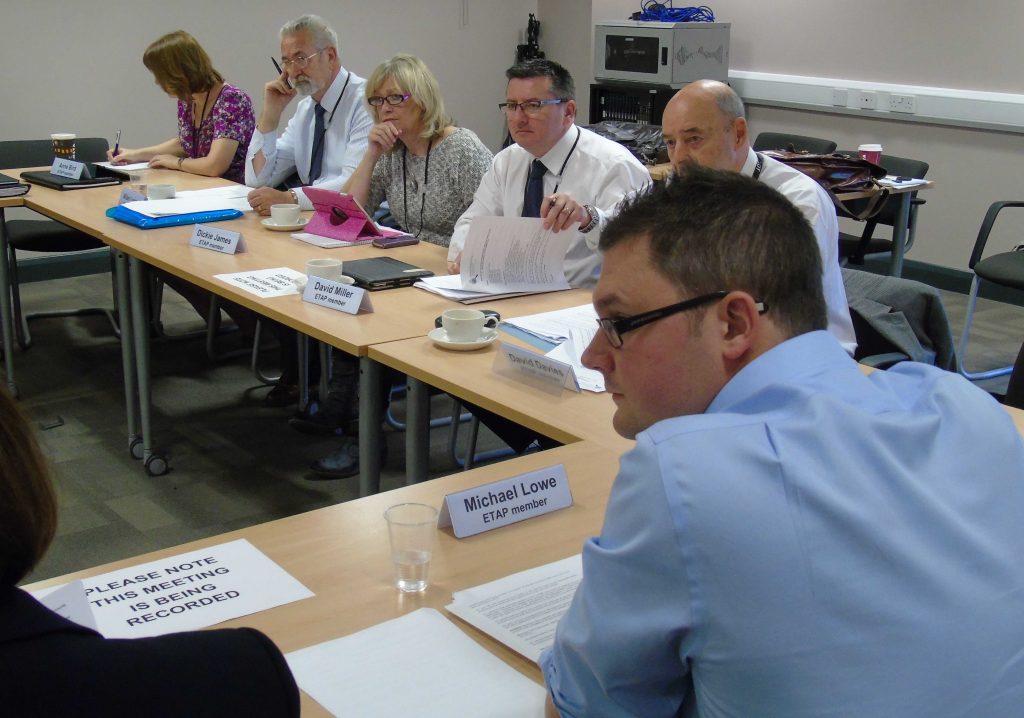Staffordshire Police have accepted recommendations made by an independent panel, set up by the Police and Crime Commissioner in Staffordshire, after the Panel found gaps in custody provisions in the county.
The Ethics and Transparency Audit Panel (ETAP), who carried out the work looking at custody facilities run by Staffordshire Police, was launched under the transparency agenda by Staffordshire’s Police and Crime Commissioner Matthew Ellis and aims for policing in Staffordshire to be the most open and transparent in the country.
Ten members of the public sit on the panel which meets regularly to monitor the work of all police including how crime is recorded, the use of tasers and major incidents.
The ETAP report found custody areas, including the Central Area Custody Facility at Burton, Southern Area Custody Facility in South Staffordshire and Northern Area Custody Facility in Stoke-on-Trent, were safe and secure but also made a number of recommendations for Staffordshire Police. ETAP members visited the Northern Area Custody Facility and also had access to records about detainees from all custody sites in Staffordshire.
ETAP recommended, in their report, a standard response time for healthcare professionals to respond to all custody facilities or potential custody facilities as they found longer response times for health professionals called to certain sites.
“Concern over the delay in healthcare professionals visiting custody suites without 24/7 cover is expressed and is something we feel effort should be made to correct,” the report added.
The ETAP review found a healthcare professional is either on site or on call through a contracted healthcare arrangement. The Northern Area Custody Facility has 24/7 healthcare cover, however the Central and Southern Area suites only have healthcare cover on demand, as have the Tier 2 custody suites.
ETAP recommends Custody Sergeants review each other’s work around risk assessments for detained people to help with consistent approaches and learning. The Custody Sergeant has total responsibility and is accountable for the welfare of the detained person, and determining the level of appropriate care level for each detainee.
ETAP also recommended their members carry out sampling of randomly selected cases, at six-month intervals, to ensure the Police and Criminal Evidence Act 1984 (PACE) is being followed consistently around areas including comprehensive handovers for the responsibility for detainees amongst custody officers.
The report said: “The Ethics Transparency & Audit Panel (ETAP) are satisfied that the conditions where Detained Persons (DPs) are held, are fit for purpose, being clean, well maintained and appear to be well managed.”
ETAP found the process for booking in and completing the Risk Assessment for detainees, which determines the level of observation set by the Custody Sergeant, was “robust”.
But the report stated: “In general, we felt that care by custody officers and healthcare professionals met the required standard. We have no evidence to doubt that officers conduct themselves in a professional way and they evidenced concern for Detained Persons. However, the non-conformity of PACE (Police and Criminal Evidence Act 1984 ) on four occasions (of which two related to the failure to have an Appropriate Adult present) means that constant reminders and regular reviews should be undertaken to ensure the highest levels of care are constantly maintained.”
Appropriate Adults are adults over 18, with no connection to the case involved, and are a statutory requirement when juveniles are being detained to ensure all of the rights and entitlements are being carried out as required.
The ETAP members also observed the quality of the data captured on the custody record system during handover, and noted the improvements introduced in April 2015. This new procedure requires full details to be noted on the record at every handover with the reason for detention, the level of observation and any medical issues.
“As this is a comparatively new procedure, it needs regular monitoring to ensure that future input remains at the highest level of detail, including clarity on the level of care set, as this was not always evident,” the report stated.
Mr Ellis said:
“I am delighted with the way ETAP has developed since I established it two years ago. ETAP is making a real difference in improving transparency and scrutinising how the police is carrying out areas of their work.”
Assistant Chief Constable Jon Drake said:
“Over 23,000 people are held in the custody facilities in Staffordshire each year and we are committed to working with our service providers to deliver the highest standards of care and safeguarding for them.
“We continually look for ways to improve this service and welcome the independent view of the ETAP report. The recommendations will form part of our ongoing development in this important area of policing.”
Following the ETAP’s success, new local independent panels, called Safer Neighbourhood Panels have been launched so that people can influence policing in their communities and help hold local police commanders to account at the most local level. They are made up of local residents, local councillors and magistrates and meet regularly with their area’s local policing commander.
The panels influence local policing and community safety, scrutinise the work done by police in the area, give feedback to their community and examine the impact of community resolutions and restorative justice where they live.
To find out more visit: http://www.staffordshire-pcc.gov.uk/safer-neighbourhood-panels/
For more information on ETAP and to see the ETAP reports go to: http://www.staffordshire-pcc.gov.uk/etap-reports/
:: This photo shows ETAP meeting on November 25 2015 examining the work of Staffordshire Police. Photo copyright of the OPCC Staffordshire.



